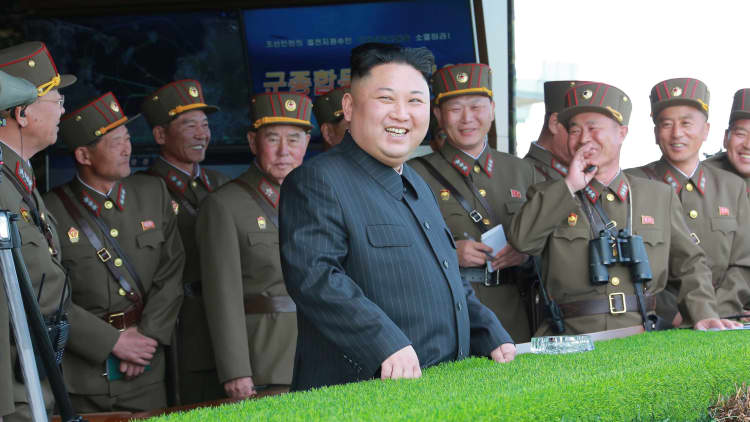The U.S. statement on North Korea this week squarely put the pressure on China to act, or otherwise suffer on trade with the world's largest economy, some political analysts said.
"Implicit in the statement is the assumption (correct, I think) that China is willing to tighten the screws more than the halfway steps they have done in the past, and that as a result, new pain will be inflicted on Pyongyang," Robert Manning, senior fellow at the Atlantic Council, said in an email.
Secretary of State Rex Tillerson, Secretary of Defense James Mattis, Director of National Intelligence Dan Coats said in a joint statement Wednesday that "we are engaging responsible members of the international community to increase pressure on the DPRK," the official name for North Korea.
President Donald Trump has repeatedly said that a China trade deal with the U.S. will be better for Beijing if they act on North Korea. As recently as last Friday, Trump tweeted:
Beijing does have economic leverage over North Korea as the rogue state's largest trading partner. For its part, China is the United States' largest trading partner — the U.S. imports far more from China than it exports to the country, creating a $347 billion deficit last year. Trump has made narrowing that deficit a major goal of his presidency.
Others in his administration have apparently embraced that view.
Based on talks with "very good sources," Manning said that Trump's tweet "really does reflect the view widely held in the White House. They seem to think this is the 'Art of the Deal' and are very pleased with themselves. At the end of the day, I suspect that any trade stuff that does not pass the test of reciprocal access will eventually lead to actions to penalize China on trade."
In Thursday's regular news conference, Chinese Foreign Ministry spokesperson Geng Shuang reiterated that China is committed to upholding U.N. sanctions on North Korea.
As for trade with the U.S., he said, "The Chinese side is ready to work with the U.S. to push forward sustained, steady and sound development of the bilateral relationship on the basis of mutual respect and win-win cooperation."
After a missile test this February, China suspended coal imports from North Korea for the rest of the year. Recent reports also show Beijing may also be closer to cutting oil exports to the rogue state, which would be crippling for North Korea.

With the pressure on China, fears of a militaristic breakout may not be realized.
"What this is really clear about is all the talk about war was press talk and not serious," Leon Sigal, director of the Northeast Asia Cooperative Security Project.
That said, he added that, "The past suggests that Chinese pressure will provoke more North Korean nuclear tests."
Rather, North Korea is ready to negotiate with the U.S., something that China has strongly encouraged, he said. "I think it's time to muffle the drums, see if we can get talks going."
The U.S. does "remain open to negotiations towards" the peaceful denuclearization of the Korean Peninsula. However, the U.S. statement concluded, "we remain prepared to defend ourselves and our allies."


